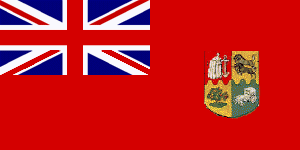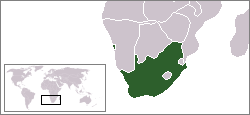South Africa
From E20
(Difference between revisions)
| Line 49: | Line 49: | ||
|} | |} | ||
| + | The Union of South Africa came into being in 1906, resulting in the consolidation of the two Boer Republics with the two British Colonies under one system of government. The two British colonies, the Cape Colony and Natal Colony, were combined with the two defeated Boer states, the South African Republic and Orange Free State, known thereafter as the Cape Province, Natal, Transvaal and the Orange Free State, respectively. | ||
{{stub}} | {{stub}} | ||
[[Category:Nations]] | [[Category:Nations]] | ||
Revision as of 01:49, 28 December 2006
The Union of South Africa came into being in 1906, resulting in the consolidation of the two Boer Republics with the two British Colonies under one system of government. The two British colonies, the Cape Colony and Natal Colony, were combined with the two defeated Boer states, the South African Republic and Orange Free State, known thereafter as the Cape Province, Natal, Transvaal and the Orange Free State, respectively.



